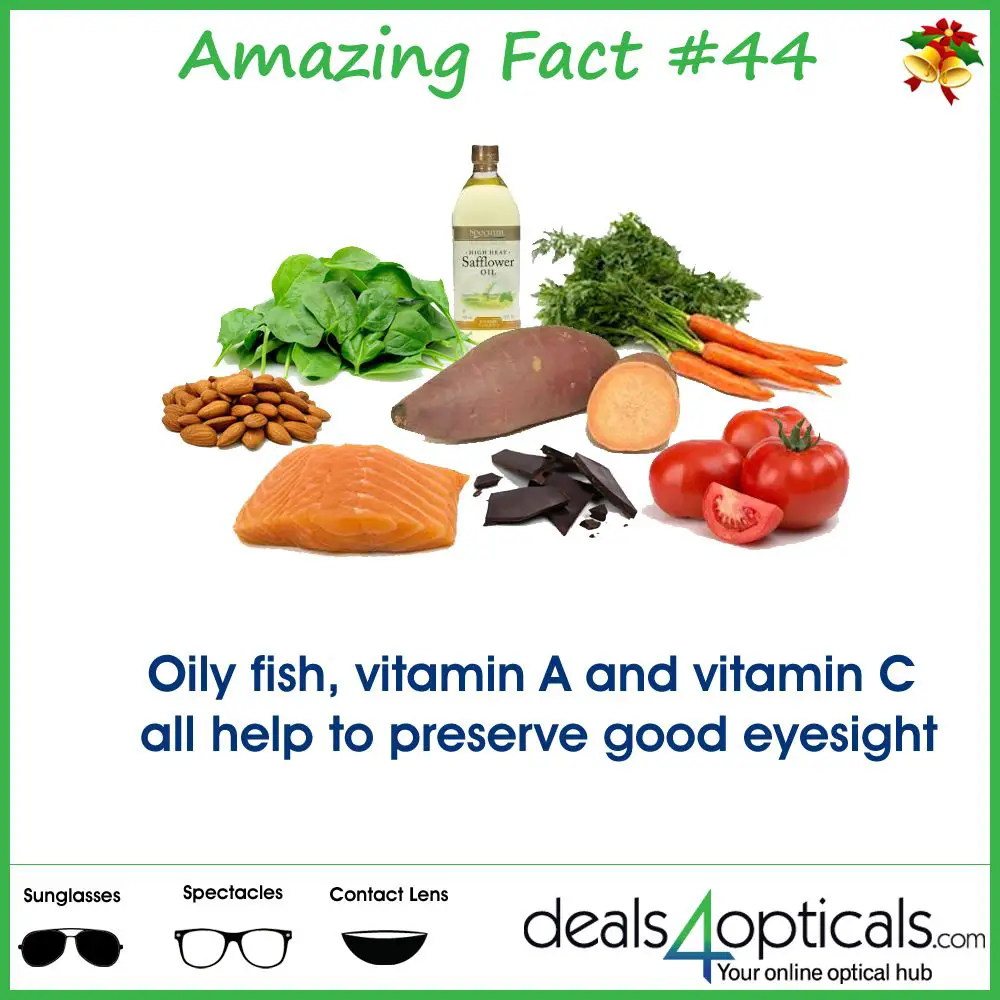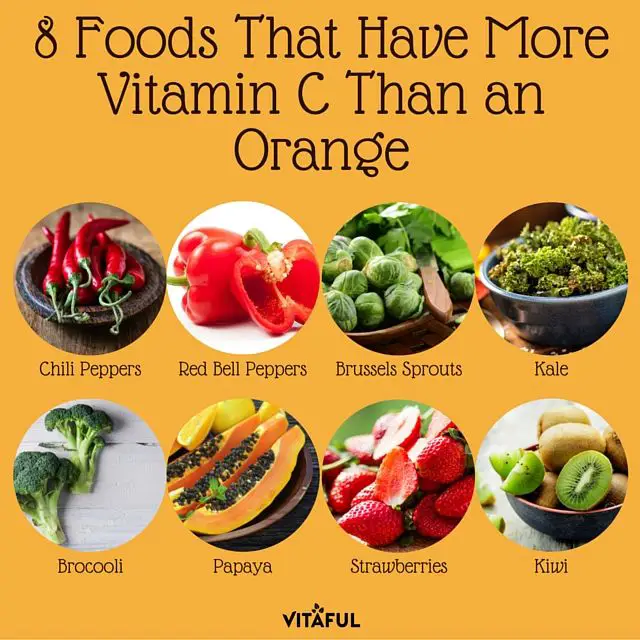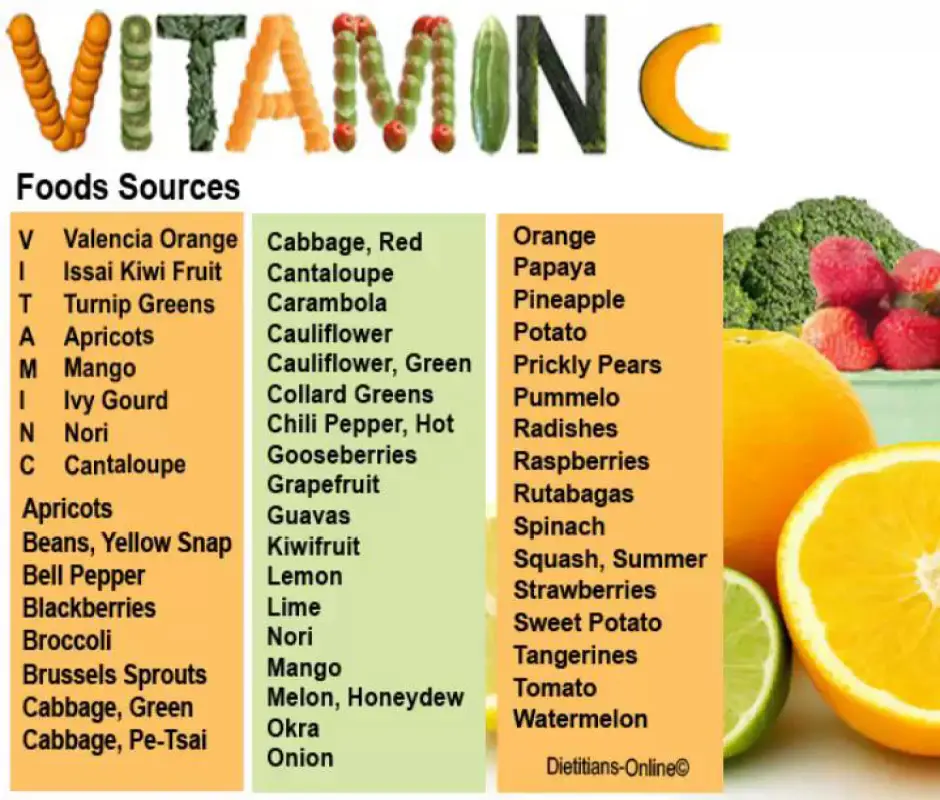Functions In The Body
Vitamin C performs and supports numerous essential functions in the human body. The Linus Pauling Institute at Oregon State University lists the following essential functions for vitamin C:
- It is an essential nutrient for the formation and maintenance of collagen in the body, which is necessary for the growth, health, and repair of bones, tendons, and cartilage.
- It serves as an antioxidant, minimizing the effects of oxidative stress in the body.
- It plays an important role in brain function by participating in the synthesis of norepinephrine, a neurotransmitter.
- Vitamin C is also critical for the formation of eight distinct enzymes that help regulate a variety of chemical body processes, and it is a powerful antioxidant that protects that health and integrity of cells.
- It plays an essential role in the synthesis of carnitine, which helps convert fat to energy.
- It enhances absorption of heme iron, which is an important element of hemoglobin. Hemoglobin is the part of blood that transports oxygen throughout the body.
Debate On The Common Cold
If you start taking vitamin C religiously at the start of cold and flu season, it might be futile. There is still a debate amongst doctors as to whether vitamin C actually prevents a cold.
Luckily, it still serves a purpose. Taking vitamin C before a cold is shown to decrease the length and severity of it, but its no help once the cold has set in.
Should I Take Supplements To Get The Vitamins I Need
While it’s possible to get all the vitamins you need by making healthy food choices, people sometimes need supplements. For example,
- All women of childbearing age should get 400 micrograms of folic acid each day from fortified foods or a supplement, in addition to folate from a varied diet.
- Older adults may have difficulty absorbing vitamin B12 from foods. They also need more vitamin D as they age. Most of their B12 intake should come from fortified foods or supplements.
- Pregnant women should ask their physician about the supplements that are right for them.
Also Check: What Is Vitamin C Cream Good For
What Is Vitamin C And What Does It Do
Vitamin C naturally found in foods asascorbic acid, is an essential nutrient that is required in our diets as our body cannot manufacture it. It is a water-soluble nutrient and is therefore not stored in the body, so the body needs a constant supply.
There are many foods that contain vitamin C in varying degrees. Foods measured to be highest in vitamin C include papaya, bell peppers, broccoli, Brussels sprouts, strawberries, pineapple, oranges, kiwi, cantaloupe melon and cauliflower.
What Does The Department Of Health And Social Care Advise

You should be able to get all the vitamin C you need by eating a varied and balanced diet.
If you take vitamin C supplements, do not take too much as this could be harmful.
Taking less than 1,000mg of vitamin C supplements a day is unlikely to cause any harm.
Page last reviewed: 03 August 2020 Next review due: 03 August 2023
Recommended Reading: How Much Vitamin C In A Glass Of Orange Juice
Vitamin C Isnt Exclusively Found In Citrus
Though citrus fruits were first used to treat scurvy, this vitamin is not limited to oranges, lemons, limes, and the like. It is actually found in higher concentration outside of the citrus family.
Guava actually ranks to be number one in Vitamin C. Here are a few other surprising fruits and vegetables that beat out the beloved citrus family:
- Brussel Sprouts
The list goes on almost indefinitely, but this goes to show you it can be gleaned from a variety of food sources.
Essential Facts About Vitamin C
Vitamin C has multiple benefits for our body, from supporting healthy skin to promoting a strong immune system. Whilst many foods contain vitamin C, it is increasingly evident given the trials and tribulations of modern day living, that we are not getting nearly enough to meet individual needs. Stress is around every corner and we are subjected to many environmental toxins in the home and outdoors. The food we eat is far removed from what food should be and the state of our health is declining constantly with chronic disease. Therefore, our nutrient demands are ever increasing, and this includes the need for vitamin C.
Read Also: What Food Contains Fiber And Vitamin C
There Are Many Forms Of Vitamin C
Ascorbic acid is the purest form of vitamin C. Careful though, because it oxidizes easily, which means you need to find tested, stable formulas. Vitamin C can cause irritation and even hyperpigmentation when not used correctly, so look into what youre investing your money in! Other forms to look out for include ascorbyl palmitate, sodium ascorbyl phosphate, retinyl ascorbate, tetrahexyldecyl ascorbate, ascorbyl glucoside, and magnesium ascorbyl phosphate. You might see these when checking the label of your vitamin C serum or other types of product.
Did you know about all of these vitamin C benefits? Tell us what you think in the comments section!
Vitamin C Rosehip Complex
The Vitamin C Rosehip Complex is a great tasting and high potency powdered supplement that is suitable for daily use. What makes this supplement different is its addition of minerals, flavonoids from rosehip and concentrated berry extracts, providing a range of naturally-occurring micronutrients and phytochemicals, on top of 1000mg of vitamin C. The additional zinc and manganese help support the immune system and protect from harmful free radicals. It is also a perfect vegan/vegetarian version of our collagen complex if you are looking to support normal collagen formation as described earlier. Readily absorbable, citrus free and boasting all of the benefits of a powder, as described above, it makes this formulation titratable to your specific vitamin C needs. Children can also enjoy this product from 4 years old at a dosage of ¼ scoop.
Also Check: Where To Buy Spring Valley Vitamins
It Was Documented Hundreds Of Years Ago
Scurvy was an illness that most sailors faced from lacking fruits and vegetables. For a long time, no one knew how to treat it. Eventually, around 1747, a breakthrough was made.
A doctor was successful in treating 12 sick sailors with citrus fruits. It was the only effective treatment and eventually gave sailors the nickname, limey. This came from sucking on limes through their voyage to prevent the illness.
What Efforts Are You Making To Help Our Environment
We reduced the size of our boxes by 6%, which results in less manufacturing, less shipping, and less paper waste. They are also printed using bio-renewable, solvent-free, vegetable-based inks to help keep chemicals out of the environment, and they are 100% recyclable. To top it all off, our new smaller boxes are FSC certified.
Read Also: What Vitamins To Take For Memory
Final Thoughts On Vitamin C
Vitamins and minerals are severely underrated in the medical community. The facts about vitamin C point toward untapped benefits with few drawbacks.
Many doctors steer away from focusing on vitamins and nutrients because they dont work as fast as their pharmaceutical cousins. If youre willing to take some time, learn what you need, and take them routinely, youll see many benefits.
It can be difficult getting the proper amount of vitamin C and other minerals through diet alone eating properly isnt always easy or an option. Supplements are a great option to fill in the gap.
When used correctly under the supervision of a professional, vitamins can help you can feel great with only a slim chance of interaction with your medication. Check out our immune support collection at our BodylogicMD shop.
How Much Of Each Vitamin Do I Need Each Day

The amount of vitamins we need is actually very smallmuch smaller than the amounts of carbohydrates, protein, and fats required for a healthy diet. For example, we need only a few micrograms of vitamin B12 per day. To give you an idea of how little this is, a teaspoon of vitamin B12 is enough to meet the daily needs of over 2 million adults!
The % Daily Value for a vitamin on a food label shows you what percent of a typical healthy adult’s daily need for that vitamin is provided by a serving of the food. For example, an 8-ounce glass of orange juice provides 120% of the Daily Value for vitamin C, and 15% of the Daily Value for folate.
Read Also: Vitamin D Dose For Adults
Vitamin C And Cancer Therapy
Vitamin C may help treat cancer, though experts have not confirmed this.
As an antioxidant, vitamin C protects the body from oxidative stress, which can occur when ROS levels are high. Oxidative stress can lead to cell damage and may play a role in some cancers.
A found that taking high doses of vitamin C may slow the growth of some types of cancerous tissue. The paper suggests that vitamin C could, one day, become a new treatment for colorectal cancer.
Also, the authors of a suggest that vitamin C might work well alongside other treatments to benefit people with cancer.
The note that some alternative therapists already use intravenous vitamin C when treating cancer, fatigue, and infections. However, they note that more research is necessary.
Intravenous vitamin C
Taking too much vitamin C is unlikely to cause any significant problems, but if a person consumes more than 1,000 mg of vitamin C per day, they will not absorb it all. This may lead to diarrhea and gastrointestinal discomfort.
People are unlikely to consume too much through their diet, and their bodies cannot store it. However, having a high intake through supplements may result in kidney stones.
This may also increase the risk of cardiovascular problems in females after menopause, but there is not enough evidence to confirm this.
Where Can I Get More Information
Your local UF/IFAS Extension Family and Consumer Sciences agent may have more written information and nutrition classes for you to attend. Also, a registered dietitian can provide reliable information to you.
Reliable nutrition information may be found on the Internet at the following site:
Read Also: What Is In Vitamin B Complex
How Should Foods Be Prepared To Retain Vitamin C
Vitamin C is easily destroyed during preparation, cooking, or storage. To retain vitamin C, follow these tips:
- Eat fresh fruits and vegetables as soon as possible after buying them.
- Cut vegetables just before eating or cooking.
- Cook vitamin C-rich foods quickly in as little water as possible.
- Microwave, steam, or stir-fry to retain the most vitamin C do not overcook.
Do Fresh Foods Have The Most Vitamins
Fresh fruits and vegetables are good sources of many vitamins. The fresher they are, the more vitamins they contain. Farmers’ markets are great sources of fresh fruits and vegetables in season.
Canned and frozen fruits and vegetables can be just as nutritious as fresh produce. When produce is canned or frozen, it is processed quickly and then sealed in a package to reduce further loss of vitamins.
Don’t Miss: What Is The Use Of Vitamin C Serum
Vitamin C Deficiency Symptoms In The Body
Its quite straightforward to get adequate vitamin C if you eat a well-balanced diet. Let’s take a look at some symptoms if you don’t get enough vitamin C, including some severe vitamin C deficiency examples:
The Kidadl Team is made up of people from different walks of life, from different families and backgrounds, each with unique experiences and nuggets of wisdom to share with you. From lino cutting to surfing to childrens mental health, their hobbies and interests range far and wide. They are passionate about turning your everyday moments into memories and bringing you inspiring ideas to have fun with your family.
Dosage: How Much Vitamin C Should I Get
Always speak with a healthcare provider before taking a supplement to ensure that the supplement and dosage are appropriate for your individual needs.
For most healthy people, it is easy to get adequate amounts of vitamin C through food. You can meet your recommended dietary allowance for vitamin C each day by eating just one of the following:
Two important caveats to these recommendations are:
- If you smoke, take an additional 35 milligrams per day.
- If you’ve been diagnosed with a vitamin C deficiency, you’ll need between 100 to 200 milligrams per day until a blood test shows normal levels.
Taking high doses may be appropriate for some people, but it usually provides no extra benefit. Your body controls how much vitamin C it absorbs.
That means it’ll take what it needs from food and supplements, and anything beyond that comes out in your urine. Taking 1,000 milligrams a day or more actually drops your absorption rate by about 50%.
Read Also: What Vitamins To Take Daily
It Doesnt Mix Well With All Medications
Not every vitamin should be mixed with every medication. Certain medicines like NSAIDs, Niacin, prescribed hormones, as well as medications for blood clotting, and some anti-depressants shouldnt be combined with a high dose of vitamin C.
Consult with your pharmacist before combining medicines and vitamin C. It may decrease how effective they are or make them overly powerful.
Myth: We Can Produce Vitamin C

FACT: Sadly, somehow, during evolution, we lost one of the four vital enzymes needed to produce vitamin C. This means we have to get vitamin C from diet or supplement to get this essential nutrient for body functioning. Make sure you are getting enough of it from diet whether from vitamin C rich food sources or via a multivitamin or Vitamin C supplement.
Recommended Reading: Can Vitamin B12 Cause Erectile Dysfunction
Myth: Citrus Fruit Is The Best Source Of Vitamin C
FACT: Contrary to popular belief, citrus fruits like oranges, lime, etc. are actually not the richest source of vitamin C. Some rich sources of the nutrient are green chili, peppers, kale, broccoli, Brussels sprouts, watercress, kiwi and red cabbage. So include a wide variety of fresh fruits and green vegetables, for a supercharged immune boost.
Reduces Effects Of Aging
If youre noticing a few signs of aging, particularly wrinkles, listen up! Vitamin C is great for collagen regeneration. Aside from smoothing out a few wrinkles, it may also help with arthritis.
When less collagen is in the body, your bones and joints tend to rub together creating aches and pains. This pain is a classic symptom of arthritis and can be lessened with a daily dose of ascorbic acid.
Also Check: What Vitamins Can I Take Together
Myth: Vitamin C Is Only Beneficial For Boosting Immunity
FACT: There is no doubt that Vitamin C is essential for boosting your immunity. But, there are other important things that vitamin C does. From boosting collagen production, healing wounds, taking care of your skin, bones, and gums to improving overall energy. However, unfortunately, most of us relate this micronutrient to only immunity.
Vitamin C is crucial when it comes to keeping us energetic and feeling alert as it is an essential ingredient in the production of hormones like cortisol and adrenaline, which play an instrumental role in producing energy and bringing about a healthy nervous and immune system. It regenerates collagen in bones, joints, and the face.
Vitamin C is also one of the most potent antioxidants, which helps to fight free radicals that cause inflammation and chronic diseases.
It plays a major role in wound healing as it regenerates collagen in the skin and other tissues.
Vitamin C is also an essential co-factor for collagen production, so a healthy intake will keep your skin elastic, smooth, and luminous with a more youthful appearance.
Adequate vitamin C also helps weight loss as it affects the body’s ability to use fat as a fuel source during both exercise and at rest. Vitamin C also improves cardiovascular health by lowering blood pressure and cholesterol level. It also helps to keep blood vessels elastic.
What Is Vitamin C
Vitamin C, or L-ascorbic acid, is an essential nutrient. That means your body doesn’t make it, so you have to get it through diet or supplements. Vitamin C is in many foods, such as oranges, red and green peppers, and kiwi.
Research has confirmed some general health benefits of vitamin C. When it comes to using it as a treatment or preventive measure for specific conditions, though, many of the studies have been inconclusive or found no benefit.
Dietary supplements are not regulated in the United States, meaning the Food and Drug Administration does not approve them for safety and effectiveness before products are marketed. When possible, choose a supplement that has been tested by a third party, such as USP , Consumer Labs, or NSF International.
However, even if supplements are third-party tested, they are not safe for all or effective in general. Therefore, it is important to talk to your healthcare provider about any supplements you plan to take and check-in about potential interactions with other supplements or medications.
You May Like: Is Kiwi High In Vitamin C
Where Are Vitamins Found In Foods
All of the food groups have foods rich in vitamins. Milk naturally contains riboflavin and is fortified with vitamins A and D. Enriched grain products contain added thiamin, riboflavin, niacin, and folic acid.
Vitamin C is found in fruits and vegetables, while only animal foods naturally contain vitamin B12. Some high-fat foods, such as vegetable oil, salad dressing, nuts, seeds, and mayonnaise, are rich in vitamin E.
It’s important to eat a variety of foods from each of the food groups to get all the vitamins you need. For information about nutrients found in the various food groups, see or contact your local UF/IFAS Extension office.